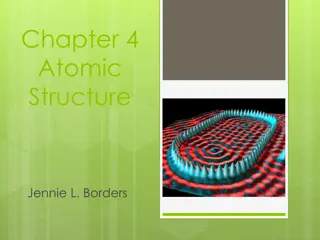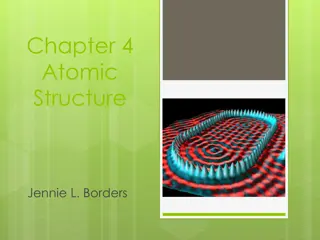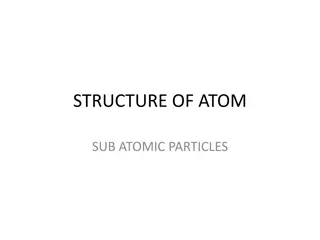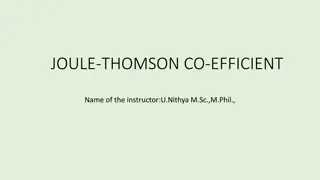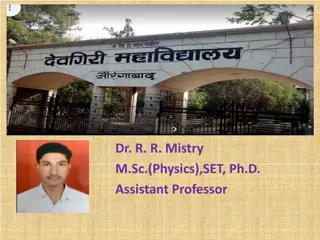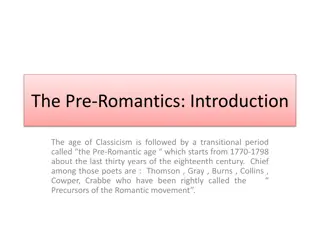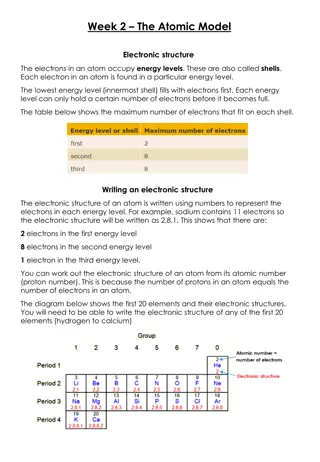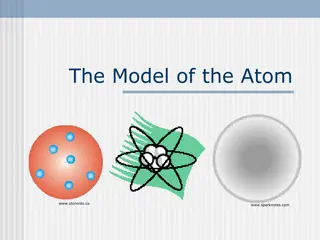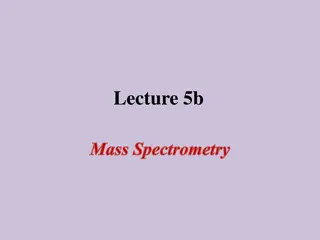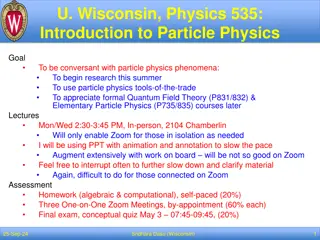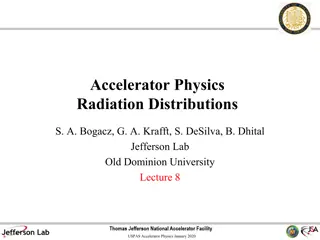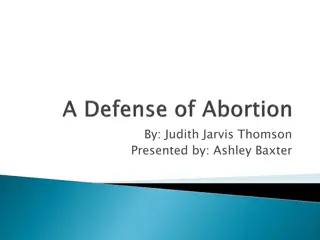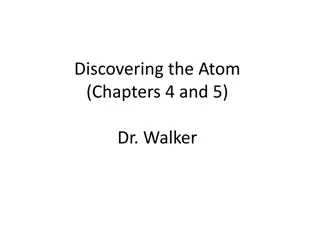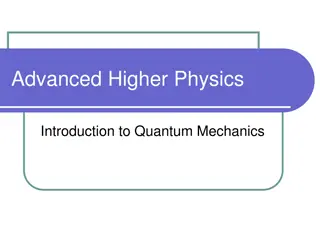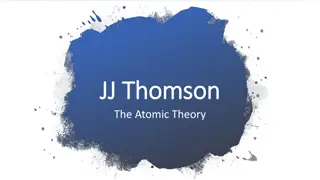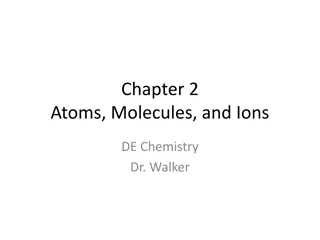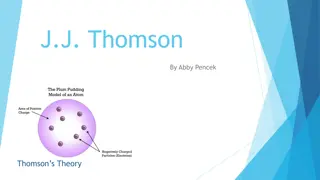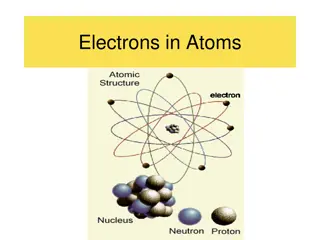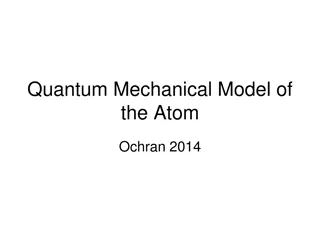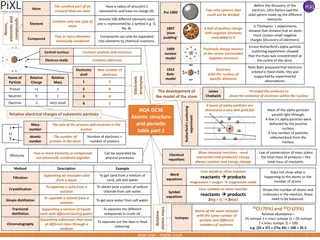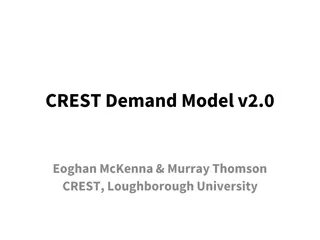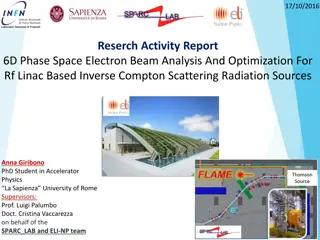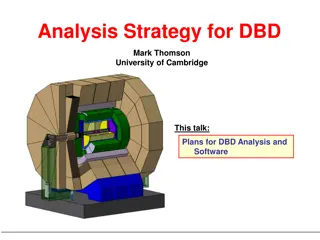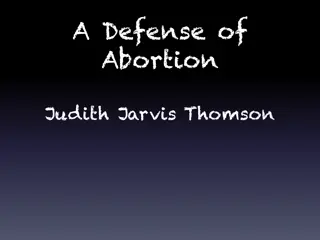Understanding Atomic Structure: The Evolution of Atomic Theories
Explore the journey of atomic theory from Democritus to Dalton and Thomson, uncovering the discoveries and concepts that shaped our understanding of the building blocks of matter. From the indivisible atoms proposed by Democritus to Dalton's theory of elements and compounds, and Thomson's experiment
6 views • 36 slides
Unveiling the Journey of Atomic Structure Evolution
Delve into the historical perspectives and key theories that shaped our understanding of atomic structure. From Democritus' concept of indivisible atoms to Dalton's atomic theory and Thomson's discoveries on electric charges, this journey explores the evolution of atomic theory through the insights
0 views • 35 slides
Overview of Atomic Structure Theories and Discoveries
Exploring the evolution of atomic structure theories, from Democritus' concept of indivisible atoms to Dalton's theory of elements and compounds. Discoveries by Rutherford and Thomson furthered our understanding of particles and electric charges within atoms.
0 views • 36 slides
Comprehensive Overview of Wharton Research Data Services for Insider Trading Analysis
Wharton Research Data Services (WRDS) offers a detailed and comprehensive coverage for insider trading analysis, executive compensation, and various transactional data. The platform compares favorably with competitors like 2iQ and Thomson Reuters, providing in-depth insights into various aspects suc
0 views • 17 slides
Exploring the Nature of Subatomic Particles and Light
Explore the intricate world of subatomic particles such as electrons, protons, and neutrons, and delve into the dual nature of light as both particles and waves. Discover the structure of atoms, their isotopes, atomic number, mass number, and the fundamental discoveries in the field of physics, incl
1 views • 16 slides
Understanding Joule-Thomson Coefficient in Thermodynamics
The Joule-Thomson coefficient describes the relationship between temperature and pressure changes in a substance. This coefficient impacts the direction of temperature change when pressure is altered. With equations and explanations provided by U. Nithya, M.Sc., M.Phil., this summary covers the defi
2 views • 11 slides
G.P. Thomson's Experiment: Confirmation of Matter Wave Nature of Electrons
The experiment conducted by G.P. Thomson in 1928 confirmed the matter wave nature of electrons through diffraction patterns obtained when high-speed electrons were diffracted from a thin metallic film. The setup involved accelerating electrons through a high potential, incident on a gold foil, and t
0 views • 6 slides
Exploring the Pre-Romantic Poets and Themes
The Pre-Romantic period, a transition from Neoclassicism to Romanticism, is characterized by poets like Thomson, Gray, Burns, and Collins. These poets ushered in a shift towards emotional expression, nature themes, and a rejection of urban life. Pre-Romantic poetry focused on nature, sensibility, me
1 views • 13 slides
Building a Business Empire: Insights from Dr. Thomson Frank Mpinganjira, CEO of FDH Financial Holdings Limited
Dr. Thomson Frank Mpinganjira, the Group Chief Executive Officer of FDH Financial Holdings Limited, shares his journey in building a successful business empire, including overcoming hurdles, setting up financial institutions, and principles of business growth. His experiences aim to inspire entrepre
0 views • 56 slides
Understanding Atomic Structure: Electrons, Energy Levels, and Historical Models
The atomic model describes how electrons occupy energy levels or shells in an atom. These energy levels have specific capacities for electrons. The electronic structure of an atom is represented by numbers indicating electron distribution. Over time, scientists have developed atomic models based on
0 views • 5 slides
Promoting Equality & Diversity at Fortrose Academy: Happy, Healthy Highlanders
Fraser Thomson, an assistant Youth Worker, introduces the efforts of the Equality and Diversity Steering Group at Fortrose Academy. Lua, Dominic, and Ethan, along with other members, share the group's goals of fostering inclusivity, raising awareness, and supporting minority groups. Through initiati
0 views • 8 slides
Measuring the e/m Ratio Experiment: Understanding Electrons' Behavior in Magnetic Fields
In 1897, JJ Thomson proved electrons were small negatively charged particles through cathode ray experiments. Today, you will replicate a similar experiment to determine the charge-mass ratio of an electron. With the provided apparatus, understand the force on electrons in a magnetic field and obser
0 views • 23 slides
Understanding WRDS 13F Holdings Data and Recent Thomson Data Issues
Delve into the realm of 13F holdings data on WRDS, covering historical stock holdings, factset ownership, and SEC requirements. Explore examples, linking to other data, and recent issues with Thomson 13F data. Stay informed about the evolving landscape of institutional investment data.
2 views • 8 slides
Saint Clair Wine Tasting Experience in New Zealand - 20.8.2024
Explore the exquisite world of Saint Clair wines in Marlborough, New Zealand. Indulge in a vinprovning experience showcasing a variety of wines, including Sauvignon Blanc, Chardonnay, Pinot Noir, and Syrah. Discover the story behind Saint Clair Family Estates, its founders Neal and Judy Ibbotson, an
1 views • 19 slides
Evolution of Atomic Models: From Thomson to Bohr
Scientists from J.J. Thomson to Niels Bohr made groundbreaking discoveries in understanding the structure of the atom. Thomson's plum-pudding model was followed by Rutherford's nuclear model, revealing the nucleus. Bohr introduced the concept of discrete energy levels and orbits for electrons. These
4 views • 22 slides
Journey Through Atomic Models: From Thomson's Plum Pudding to Rutherford's Gold Foil Experiment
Explore the evolution of atomic models starting with J.J. Thomson's Plum Pudding Model in 1897, where the discovery of electrons led to the belief of a positive "glue." Follow the progression to Ernest Rutherford's Gold Foil Experiment in 1910, challenging the Plum Pudding Model and unveiling the nu
0 views • 27 slides
Understanding Mass Spectrometry: From History to Techniques
Explore the fascinating history of mass spectrometry, from the discovery of isotopes by J.J. Thomson and F.W. Aston to modern developments like the quadrupole mass spectrometer. Learn about Electron Impact Mass Spectrometry, its techniques, and the information derived from mass spectra, including mo
0 views • 15 slides
Evolution of Electricity Commercialization Through Key Innovations
The commercialization of electricity has evolved through various key inventions and innovations by pioneers such as Pavel Yablochkov, Humphry Davy, Elihu Thomson, Edwin Houston, Moses Farmer, William Wallace, and Thomas Edison. From the early work with AC and DC currents to the development of superi
0 views • 47 slides
Introduction to Particle Physics at U. Wisconsin: Physics 535
Dive into the captivating world of particle physics with Physics 535 at University of Wisconsin. Explore phenomena, delve into Quantum Field Theory and Elementary Particle Physics, and prepare for research work. Engage in in-person lectures supplemented by Zoom for those in isolation. Utilize textbo
0 views • 8 slides
Comprehensive Overview of Radiation Distributions in Accelerator Physics
Explore the intricate calculations and theoretical frameworks of radiation distributions in the context of pulsed high-field strength lasers interacting with electrons, covering topics such as Thomson scattering, undulators, and historical developments in the field. The discussion delves into the nu
0 views • 57 slides
The Ethics of Abortion: Perspectives and Arguments
The discussion revolves around Judith Jarvis Thomson's views on abortion, challenging the notion that a fetus is a person from conception. Various arguments are presented, such as the violinist analogy and the right to life vs. bodily autonomy debate. Thomson's analysis refutes extreme views on abor
0 views • 11 slides
Evolution of Atomic Theory: From Democritus to Thomson
Examine the evolution of atomic theory through the contributions of key scientists such as Democritus, Dalton, and Thomson. Explore the concept of subatomic particles, different models of the atom, and the impact of experiments on our understanding of the atom over time. From the solid sphere model
0 views • 33 slides
Evolution of Atomic Models: From Ancient Philosophers to Quantum Mechanics
Tracing the evolution of atomic models from the ancient Greek philosophers' concept of indivisible atoms to the groundbreaking discoveries of electrons, protons, and neutrons. The journey through Thomson's Plum Pudding model, Rutherford's planetary model, Bohr's quantized model, and the introduction
0 views • 14 slides
JJ Thomson: Discoverer of the Electron and Pioneer in Atomic Theory
JJ Thomson, Nobel Prize-winning physicist, discovered the electron in 1897 through his study of cathode rays. He proposed the Plum Pudding Model of the atom, revolutionizing the understanding of atomic structure. His work on electrons, isotopes, and mass spectrography solidified his legacy as a lead
0 views • 7 slides
Chapter 2. Atoms, Molecules, and Ions
Explore the historical timeline of atomic theory advancements, from Demokritos' initial concept of "atomos" to Dalton's Atomic Theory, Thomson's discovery of the electron, and modern breakthroughs by scientists like Rutherford and Lawrence. Avogadro's contributions to the mole concept and gas laws a
0 views • 46 slides
The Impact of J.J. Thomson's Discovery of the Electron on Atomic Theory
J.J. Thomson's groundbreaking discovery of the electron in 1897 revolutionized the understanding of atoms. His Plum Pudding Model proposed in 1904 depicted electrons embedded in a positively charged matter, challenging the previous Dalton's Billiard Ball Model. This discovery transformed the atomic
0 views • 7 slides
Exploring the Evolution of Atomic Theory
Delve into the historical journey of atomic theory starting from Democritus and Aristotle's views to modern advancements proving some aspects of Dalton's theory incorrect. Learn about key laws and theories such as the Particle Theory of Matter, Dalton's Atomic Theory, and JJ Thomson's discoveries, s
0 views • 30 slides
Evolution of Atomic Theory Through the Ages
Explore the fascinating journey of the atomic theory from the ancient ideas of Democritus in 450 BC to the groundbreaking discoveries by scientists like Benjamin Franklin, John Dalton, Sir William Crookes, J.J. Thomson, and more. Witness the evolution of our understanding of atoms and their structur
0 views • 21 slides
Evolution of Atomic Models: From Dalton to Bohr
Explore the progression of atomic models from John Dalton's theory of tiny, structureless particles to J.J. Thomson's Plum Pudding model, Ernest Rutherford's discovery of the nucleus, and finally Niels Bohr's model with fixed electron orbits and energy levels. Witness the journey of scientific under
0 views • 28 slides
Evolution of Atomic Models: From Rutherford to Quantum Mechanics
Various atomic models have been proposed throughout history, starting with John Dalton's idea of atoms as tiny particles to J.J. Thomson's Plum Pudding model. Ernest Rutherford's discovery of the nucleus and Niels Bohr's quantum model of the atom revolutionized our understanding. Bohr's proposal of
0 views • 38 slides
Development of the Atomic Model: From Dalton to Rutherford
Before the discovery of the electron, John Dalton proposed the solid sphere model for elements, while JJ Thomson's experiments led to the discovery of electrons. Ernest Rutherford's alpha particle scattering experiment revealed the concentrated mass at the nucleus, which formed the basis of the nucl
0 views • 4 slides
Evolution of Atomic Theory: From Democritus to JJ Thomson
Foundations of atomic theory trace back to Democritus and Aristotle, evolving through the discovery of laws in the 18th century by Dalton's Atomic Theory. Modern advancements and JJ Thomson's discoveries led to a deeper understanding of the structure of atoms.
0 views • 40 slides
CREST Demand Model v2.0 Eoghan McKenna & Murray Thomson
The CREST Demand Model v2.0, developed by Eoghan McKenna & Murray Thomson at Loughborough University, is a comprehensive simulation tool that analyzes the energy demand of dwellings. It considers factors such as solar thermal collectors, climate data, irradiance, electrical demand, temperature, gas
0 views • 4 slides
Electron Beam Analysis and Optimization for RF Linac in Inverse Compton Scattering
This research activity report discusses the analysis and optimization of a 6D phase space electron beam for RF Linac-based Inverse Compton Scattering radiation sources. It covers the SPARC_LAB Thomson Source and ELI-NP GBS, including experiments, simulations, and studies on beam parameters and struc
0 views • 26 slides
Analysis Strategy for DBD by Mark Thomson - University of Cambridge
Mark Thomson from the University of Cambridge presented the analysis strategy for the Dual-Beta Detector (DBD) at the ILD Analysis Meeting in Paris, focusing on software models, reconstruction, and validation plans. The strategy includes goals to ensure required physics analyses, develop software mo
0 views • 11 slides
A Defense of Abortion by Judith Jarvis Thomson
Judith Jarvis Thomson, an American moral philosopher, presents thought-provoking ideas on the permissibility of abortion. She challenges the focus on whether a fetus is a person and instead explores the arguments surrounding a woman's right to her own body, especially in extreme cases where the moth
0 views • 17 slides

